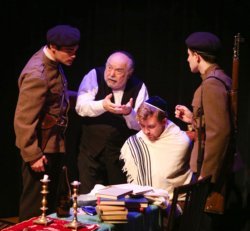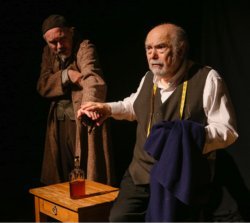
Larry Litt
|
Two
Yiddish delights by Wolf Mankowitz "2
by Wolf" Yiddish for me is primarily a nostalgic family memory. I can hear my parents and grandparents speaking Yiddish to each other in our house. Why they never taught us kids the mama lauschen (mother language) I'll never know. I like to think it was to keep secrets from us. Secrets about horrors in wartime Europe. About lost family members. About a nearly destroyed living culture riding high at its most creative 20th century peaks. What Yiddish's European fascist enemies couldn't obliterate is the essential spirit of a highly literate and theatrical people. A theater which portrayed characters in animated exaggerations as opposed to the then new 'naturalism' from Scandanavia. Yiddish theater was and is about extremes of acting, a psychological depiction of almost clownish personas. They may or may not be wearing kippahs or any other Jewish identifying facial hair or garments, but we know they're Jewish by their actions. Yiddish theater characters often ooze generosity, healing, bargaining, compassion and resignation among their traits. On the other hand they are wary of outsiders, even outsiders who are their own co-religionists. In Yiddish theater the audience never knows which character can end up exonerated or an antagonist. Not until the very end when a particular Yiddish truth is told.
The first of these two short Wolf Mankowitz one acts is the tri-lingual "The Irish Hebrew Lesson." We're offered a tense character study of eternal desperation and generous cultural education. Fergal O’Hanlon breathes fear and loathing into the brave Irish revolutionary gunman on the run from the Black and Tan British police. He's hiding in a shtibil, a one room synagogue in Dublin. An old Jewish man, authentically played by Michael 'Menachem' Fox, is sitting there peacefully praying when he hears nearby gunfire in the streets. Suddenly his prayers are interrupted when a frantic young gunman enters. This is an 'unexpected knock at the door' encounter like no other in theater history. What can a devoted, brash, young Irish revolutionary learn from a devoutly religious Jew? What does a Jew do when confronted with police aggression? There's a moral controversy and resolution in this little gem that reminded me why we have a Judeo-Christian ethical culture.
Our second Yiddish delight is loosely based on Nikolai Vasilevich Gogol's famously sad and narcissistic ghost story "The Mantle." Maury the Schneider (tailor) is down and out, drunk and feeling sorry for himself. Michael 'Menachem' Fox’s portrays his misery the way one sees an old uncle who has lost almost everything except the loving voices of his secret invisible friends. Maury is slowly drinking himself into oblivion until Fender enters his shop. Fender for whom a new overcoat, or mantle as it's called here, is a must since the one he's wearing is worse than threadbare. The mantle is so thin it's almost a shroud. Even patches won't keep out the cold. Fender needs a new coat because he works in a cold warehouse for the despicable boss Ranting (Ilan Kwitten) who takes from Fender all has and gives back as little as possible. Kwitten is duly dastardly in a Snidely Whiplash way. After all he's a character in a comedy. But it is Shane Baker's Fender who moves us to understand that even the dead deserve respect no matter how poor or insignificant they seem to the living. Baker's minimal movement is wonderful in contrast to Fox's exaggerations. These actors' twists and turns make for easy watching. Do we need to know Yiddish to enjoy these two little tastes of Yiddish theater? Not at all. David Mandelbaum has created easy to read translations that are projected on a large screen above the stage. Bring your desire for a hour or so of drama, comedy and cultural difference. Makes me want to learn Yiddish.
|
| home |
columnists | reviews |
cue-to-cue | welcome |
| museums | recordings |
coupons | publications |
classified |

